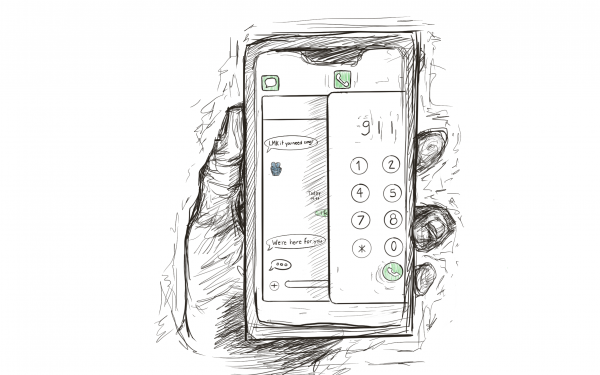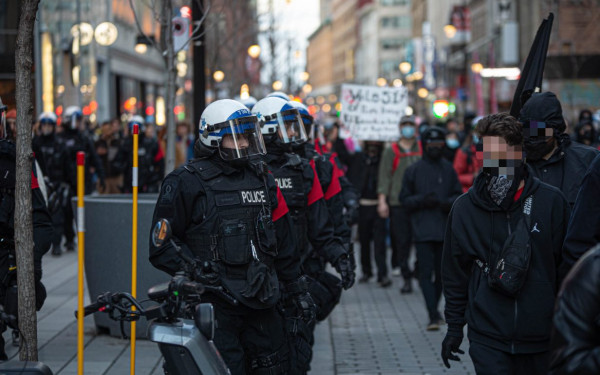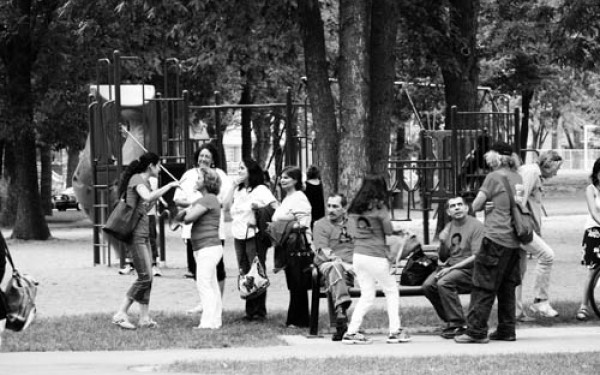Artists, Vendors, Activists Assemble for Defund the Police Festival
Coalition of Skaters, Thrifters, Musicians and More Speak About Building Community
On Sept. 10, dozens of artists, vendors, businesses and community organizations gathered at Parc Notre-Dame-de-Grâce for a Defund the Police Festival.
Organized by the Defund the Police Coalition, the event featured public discussions on topics ranging from gentrification to Indigenous justice, and was billed as a space for connecting communities.
The Coalition, composed of over 80 member organizations and associations, was founded in 2020 to seek community safety alternatives to the SPVM, an organization with a well documented history of violence and racism. The Coalition’s mandate demands 50 per cent of the SPVM’s budget be reallocated to the communities it harms the most.
Held on a sweltering Saturday, the festival had a carnival-like atmosphere. Children eagerly lined up for face painting stations, businesses and organizations such as Librarie Racines—a Black-owned bookstore–established their presence at individual booths.
Sarah Wells and Lauren Trottier–aspiring vintage clothing saleswomen–had set up their wares across two picnic tables. Wells said that she first heard of the festival through social media, and that the two of them attended to show their support for the Defund the Police movement.
Both Wells and Trottier explained that festivals like this one are good alternatives to traditional protests because they’re more accessible for children and the elderly.
“Even with the kind of activism we do, where we’re just holding signs, I don’t think young kids should be going to that stuff,” said Trottier. “You can get angry people from the public or counter protesters. People get genuinely mad, like come up [to us] and harass us,”
_900_600_90.jpg)
In another corner of the park, a cenotaph had been repurposed for an impromptu skate jam. No Damn Good, a skateboard brand owned by Alex Chaussé, was present to donate much of their merch, hold a skateboarding competition for interested youth, and represent NDG’s large skateboarding community.
“There is some kind of relationship with [the Defund the police movement]. [The police have] always been bothered by us, and us by them, so I think we and the movement go hand in hand,” Chaussé said.
Chaussé said his dream is to open a physical skate shop in NDG so that local enthusiasts don’t have to trek downtown for supplies. He added that having a resource like this could be a big win for the community’s youth.
“It was more viewed as a bad thing back in the day. Now, it’s way more inclusive. There's a bunch of little girls who skate, parents are even pushing their kids to skate too,” he said.
Also present to service the youth of NDG was Centre Kapwa, an organization that provides culturally relevant mental health resources for Filipinx youth and families. On display at the organization’s booth were several children’s books and graphic novels detailing historical and mythological figures from Filipinx culture, such as Lapu-Lapu.
Veronica, a member of the organization, explained that Centre Kapwa attended because they share similar views to the Coalition’s around decolonization. She added that Centre Kapwa aims to erase colonial mindsets in NDG’s Filipinx community by platforming their artists and stories, as well as by offering mental health workshops on subjects such as toxic masculinity.
France Stohner, co-founder of Centre Kapwa, explained that the response from Filipinx youth has already been promising, and that by providing them with these resources, she hopes to build a new generation of Filipinx academics.
_900_600_90.jpg)
“I grew up in a poor family and dropped out of high school because of mental health issues. I was a depressed teenager, and that’s not talked about in our culture. So I grew up thinking I dropped out or couldn’t find jobs because I was stupid,” said Stohner. “I was seeking out the help that was culturally relevant, and couldn’t find it. So I became the [counsellor] I wanted to see.”
In partnership with the Coalition, MTL vs. Racisme–a concert series founded in part by Paul Cargnello–held an evening of live music at the park. Cargnello explained that what began in 2018 as an almost spontaneous reaction to far right politics in NDG had grown to become a festival with funding by and permits from the city of Montreal.
“I’m not so naive that I think a song can change the world, or that music, a party can change things in a grand way. But I think as artists, we can sometimes reinforce ideas that are already there. As organizers, we need to reflect some of the change that really needs to happen,” said Cargnello.
He added that festivals and concerts such as these are beneficial to the cause because they normalize anti-racist action as everyday, non-radical acts.
“Kids come out, families come out to this thing. I hope the celebration comes first, and the politics second. It makes antiracism this normal thing instead of this radical statement. This should be a mainstream sentiment, and the partying should come first,” he said.

_900_600_90.jpg)


_600_375_s_c1.png)


